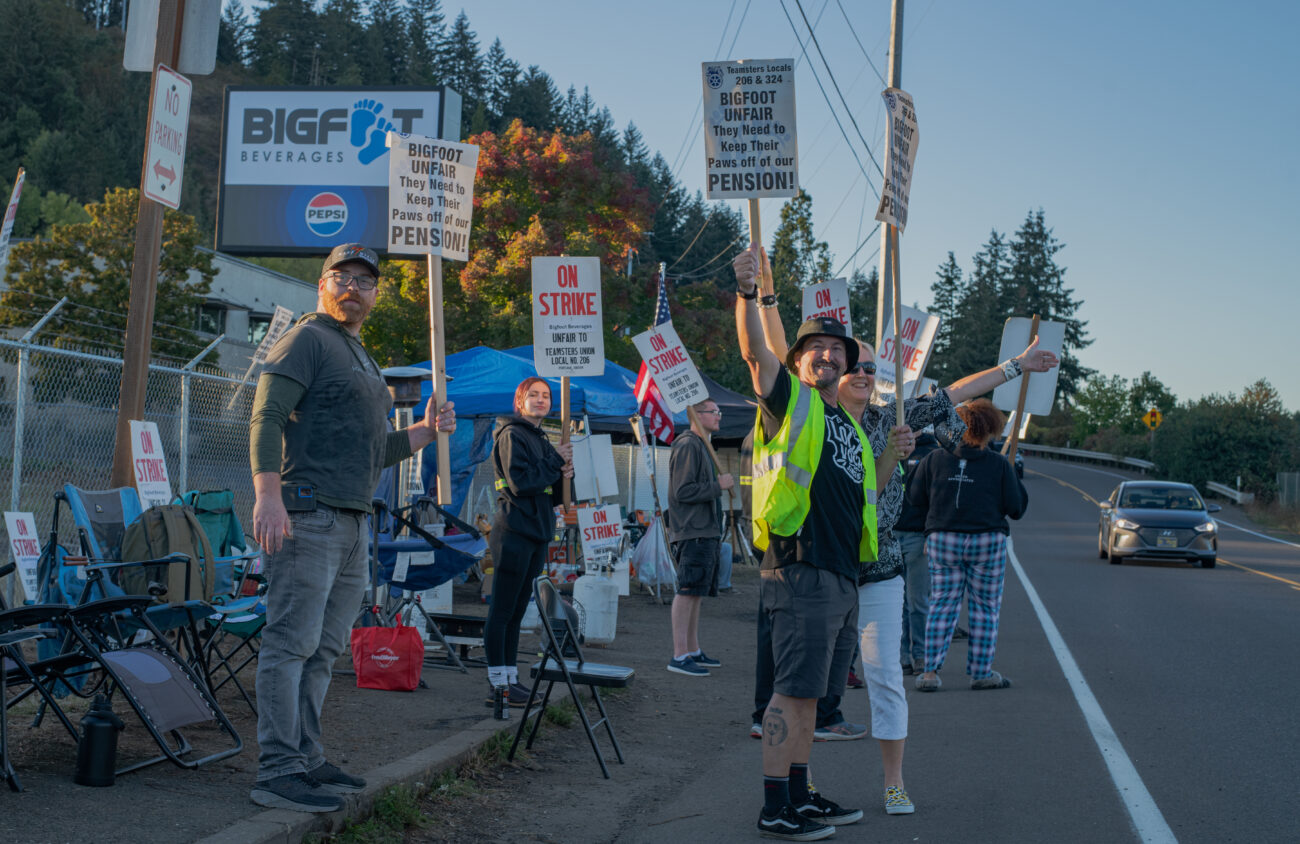Teamsters Locals 206 and 324 filed their combined ninth unfair labor practice charge against Bigfoot Beverages on Dec. 9. Both unions alleged the Eugene-based regional drink distributor illegally withdrew recognition of their representation on Nov. 26, 68 days after the 240 union members began striking on Sept. 19.
The strike is more than 90 days in; Bigfoot employee and Teamsters member Edwin Powell says he’s been on the picket line every day. “People are fired up.” He says that you would think that almost 100 days into a strike, it “is going to wear on somebody. I would have thought that, too. Seeing how motivated we are to fight for this is honestly inspirational.”
The most recent charge, filed with the National Labor Relations Board, alleges Bigfoot Beverages is illegally and intentionally withholding information about employees, including their eligibility for health care and extra vacation days heading into the new year.
“The company is trying to do everything they can to end this protest — to end our strike,” Powell says.
Chris Muhs, the secretary-treasurer and principal officer for Local 324, says the drink distributor outright said “No” when asked for the information. As of Dec. 3, Bigfoot Beverages employees became represented entirely by Local 324, rather than two separate Teamsters unions. Muhs says this was after the International Brotherhood of Teamsters determined it would be better to have one union in charge of representation.
Bigfoot Beverages did not respond to Eugene Weekly’s request for comment.
The striking employees — who’ve been on the picket line since Sept. 19 because the drink distributor pulled its long-standing pension plan off the bargaining table — will lose their health care benefits at the end of the year and lose any accrued vacation pay, Muhs says.
“They know that there is nothing they can take from us but health insurance, so they came after it,” Powell says. However, Powell says employees on the picket line anticipated this outcome. “We were right. We were prepared,” he says.
Bigfoot Beverages was offering a 401(k) with an automatic contribution from the company, equal to nine percent of the employee’s pre-tax paycheck without any requirement for employee contribution, according to a Sept. 19 press release by Bigfoot Beverages. This 401(k) contribution would have been guaranteed after an employee passed probation.
But that contribution is far less than what Bigfoot would pay into the long-standing defined benefit pension plan.
However, Bigfoot Beverages still refuses to provide information about striking employees’ health care benefits stopping at the end of the calendar year, Muhs says.
“They’re claiming that because they’ve withdrawn recognition, they no longer have a legal burden,” he says. According to a Nov. 26 letter sent by Bigfoot Beverages co-presidents Eric Forrest and Andy Moore, the Teamsters union is no longer recognized due to a petition from the majority of the employee bargaining team “showing they wish to no longer be represented by the union.”
Bigfoot Beverages did not respond to EW’s request to see the petition.
“We are grateful you have put your trust in our team and look forward to establishing a direct relationship with you, without a union,” the letter reads.
Muhs says he’s seen no such petition, and says that to no longer recognize a union, the represented employees must take a decertifying vote. Powell says he doesn’t know any employees who want to de-unionize.
“None of our members were given the opportunity to vote,” he says. Teamsters responded by filing its eighth unfair labor charge against the drink distributor on Nov. 27.
The National Labor Relations Board, the federal agency that decides labor disputes, has yet to process any of the nine unfair labor charges. Muhs says this is due to a backlog of cases.
Since beginning the strike more than 90 days ago, the union has filed unfair labor charges alleging the company conducted surveillance of striking employees, refused to furnish information on employee healthcare and bargained in bad faith by misrepresenting the value of their 401(k) proposal.
Ceasing contributions to the Western Conference of Teamsters Pension Trust, the existing traditional defined-benefit pension plan, is a non-starter for the union, and Muhs says the employer knows this. “Their whole impetus for the whole thing is to just break the union,” he says. To be recognized as a Teamsters union by the international union, members and employers must be paying into the conference’s pension, Powell says.
However, Muhs admits that for the employer, defined-benefit pension plans are more expensive to fund than 401(k) plans. “The hourly contribution that they were already obligated to pay into the (defined-benefit) pension was almost double” what Bigfoot Beverages was offering to contribute to this new 401(k), Muhs says. To make up the difference, employees would have to contribute their own money into the 401(k), he said.
Umpqua Bank would run the 401(k) plan, he says. Forrest sits on Umpqua Bank’s board of directors. “Your face is on the board of the bank that you want these investments to go through. It is a bad look. It is a bad sign,” Powell says.
In the Nov. 26 letter sent by Forrest and Moore, the drink distributor said it will implement the terms of “what you’ve seen as our last, best and final offer.”
The whole reason behind striking was that during bargaining the regional drink distributor pulled discussions of the long-standing defined-benefit pension plan off the table, Muhs says. “The union ultimately was willing to freeze the current pension contribution rate and not take any [wage] increases … and they still said no,” he says.
